To know which RV will be right for you will take some initial research on your part. With RV’s there is a wide assortment of types, sizes, accessories and price ranges. Take the time to discuss with your family or group that will be using the RV your specific needs from the RV and how you plan to use it. To learn more about the different types of RV’s take a minute to visit our RV Styles Section.
A reputable RV dealership will have professional sales, parts and service staff. This is an important consideration during and after the purchase of your RV. Just as important that you select the right type of RV, floor-plan and brand, selecting the right RV Dealership can make your RV buy and ownership experiences much more pleasurable. You can find a RV Dealership near you through our Find a Dealer search.
There’s an affordable Recreation Vehicle fit for any lifestyle or budget!
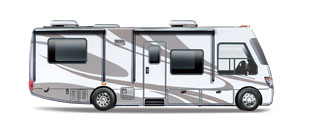
Size 21 to 40 feet
Sleeps Up to 6 people
Starting Price $60,000
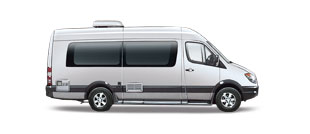
Size 16 to 22 feet
Sleeps Up to 4 people
Starting Price $60,000
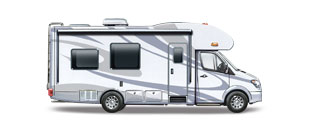
Size 21 to 35 feet
Sleeps Up to 8 people
Starting Price $43,000
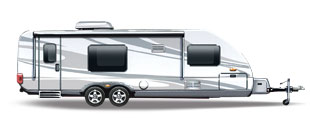
Size 12 to 35 feet
Sleeps Up to 10 people
Starting Price $8,000
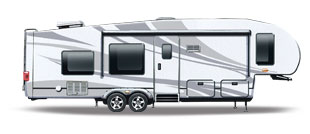
Size 21 to 40 feet
Sleeps Up to 6 people
Starting Price $18,000

Size 19 to 30 feet
Sleeps Up to 8 people
Starting Price $10,000
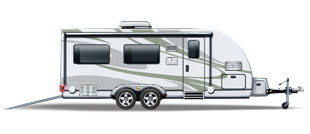
Size 19 to 39 feet
Sleeps Up to 8 people
Starting Price $10,300
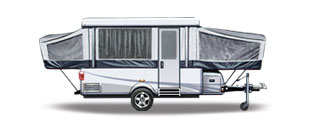
Size 8 to 24 feet
Sleeps Up to 8 people
Starting Price $6,000
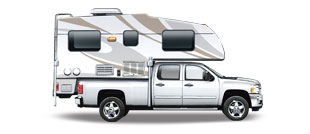
Size 8 to 20 feet
Sleeps Up to 6 people
Starting Price $6,000
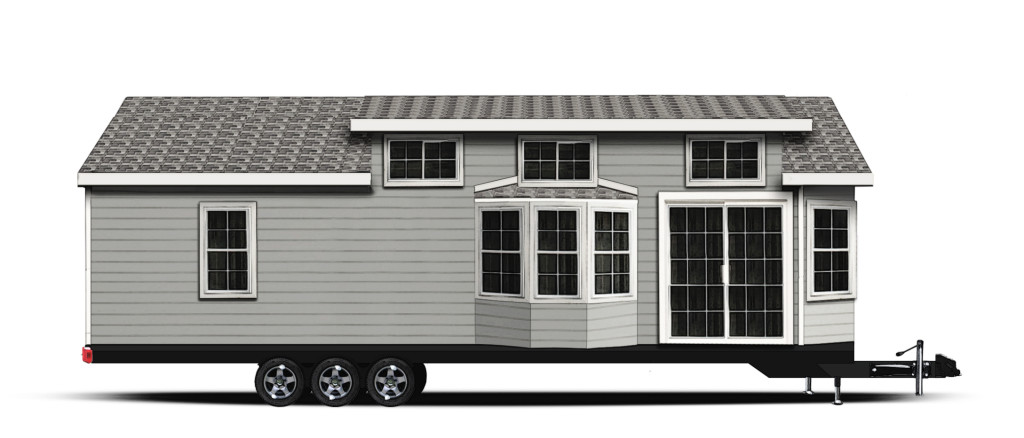
Size Up to 400 Sq. ft.
Sleeps Up to 10 people
Starting Price $80,000
 Selecting the right tow vehicle to tow your RV might seem like a daunting task. What you have to base your decision on is primarily the vehicle’s specifications, its towing capacity and your feel for the vehicle. There are still many choices to be made about the engine, transmission, suspension, brakes, features and whether you want two or four-wheel drive.
Selecting the right tow vehicle to tow your RV might seem like a daunting task. What you have to base your decision on is primarily the vehicle’s specifications, its towing capacity and your feel for the vehicle. There are still many choices to be made about the engine, transmission, suspension, brakes, features and whether you want two or four-wheel drive.
Here are some important items to consider buying a vehicle to tow your RV.
The tow vehicle must have sufficient power. A ratio of about 50 pounds of gross combined vehicle weight per every one horsepower (11,000 pounds combined wt. divided by 50 equal 220 h.p.) will deliver the best performance.
When computing your weight allowance, don’t forget to add for water, propane, food, personal items, spare tire, people and anything else that may add weight.
Most engines need to turn about 2,600 to 3,000 RPM while towing to develop sufficient horsepower. Axle gearing must be selected to permit the engine to turn comfortably within these limits. Also, remember that tire size is an important part of the equation and can significantly affect overall performance.
Ideally, the tow vehicle will weigh more than the trailer for good towing control. With larger trailers this is not possible and makes the careful selection of a towing system very important.
Remember, tow vehicles with a long wheelbase give a good ride and superior towing control, but require a larger turning radius. Tow vehicles with a short wheelbase turn more sharply, but may have a choppier ride and give less control of the longer trailers.
Do not sacrifice horsepower for fuel economy. The fuel saved will not compensate for the loss of towing performance. Towing requires large engines. There is no such thing as too much power when you’re towing. Farlow’s First Law: “The amount of power you don’t buy will be exactly what’s required to get over the next mountain.”
Tow vehicles require a large mirror mounted on each front door for safe driving. In addition, a three-inch convex mirror should be used to eliminate blind spots.
A good brake controller is needed to coordinate braking between the tow vehicle and the trailer. Be sure the controller is large enough for the trailer. Also, a braking system may be a good investment on even the smaller trailers.
Tow vehicles with automatic transmissions require an auxiliary transmission cooler. It is strongly suggested that the auxiliary cooler be 50% larger than what the actual specifications call for. Standard equipped factory transmission coolers, not rated for towing, are not large enough for towing any trailer over 3,000 lbs.
 If you are in the market for a new RV or just want to see what RVing has to offer, an RV show is the place for you. At an RV show you get the opportunity to try out various vehicles, compare different layouts and shop various manufacturers and dealers. It’s a one stop shopping experience that makes looking at numerous styles, brands, models and prices easy.
If you are in the market for a new RV or just want to see what RVing has to offer, an RV show is the place for you. At an RV show you get the opportunity to try out various vehicles, compare different layouts and shop various manufacturers and dealers. It’s a one stop shopping experience that makes looking at numerous styles, brands, models and prices easy.
If you’re not sure if you want a fifth wheel or a motorized, RV shows can help with the decision by being able to compare both types without leaving the show. Maybe you’ll determine that a travel trailer or a fold-down provides everything you’re looking for in your RV experience.
From new RVers to seasoned campers, there’s something for everyone at an RV show.

We covered the benefits of attending an RV show earlier. Now that you have decided to go, here are a few tips to get the most out of the show and have a great day.
Decide What You Need: It is good to have an understanding of how and where you would like to use your RV and what your budget is. RV shows can have hundreds of new models on display. Knowing this information from the onset will help you narrow down your search to a manageable level.
Put on the Comfy Shoes: RV shows are large. It can typically take a few hours to all day, depending on your level of interest, to see everything you want to see. There is also a lot of climbing in and out of units. A good pair of shoes will keep you on your feet.
Grab the Paper and Pen: As you view the models, it can be helpful to take notes and write down any question you may have for the dealer staff. You can also create a short pros and cons list of what you see.
Take the RV Show Program: The program will not only contain a list of the dealers present and their contact information but it will also have a map of the entire show site. This will help you plan out your visit better.
Take a Test Trip: Just walking through a model does not tell you if it is the best fit for you. If you think this might be The One, try it out. Stand in the shower, sit on the furniture, lay in the bed, really check out the kitchen….check everything out.
Ask Questions: You will not find a larger grouping of Dealer and Manufacturer Representatives in one spot than at an RV Show. These people are great resources for information on their product. Consult your notebook and ask away, there is no reason to leave with any questions lingering.
Stay Focused: It can be a lot of fun to check out the fully loaded Class A models. But if you are searching for a travel trailer, and spend too much time with the Class A’s you might not leave yourself with enough time to accomplish your goal.
Ask for a Return Pass: Everyone at the show knows that buying an RV is a big decision that you might need time to consider and talk over with your family. If you need some time to consider the offer a dealer has made you, tell them. They should have a pass that will get you back into the show after you have had some time make a decision.
At times it might sound like RVers are speaking a foreign language. We have compiled these common RVing terms to help you make sense of it all.
Basement: Under floor storage area accessible from the outside.
Black Tank: Holds body waste (sewage) directly from the toilet.
Black Water: Waste contained in the Black Tank.
Boondocking: A style of camping that has no hook-ups for power, water or sewerage.
Chassis Battery: The battery used to start the engine in a motorhome.
Class A: This is a Bus style RV.
Class B: Often referred to as Conversion Vans.
Class C: Have the appearance of a long body pick-up with the bed removed and an RV section built on.
Cut-Off Switch: Cuts off power to the ‘house’ portion of the RV.
Fifth Wheel: An RV that is towed behind a truck with a hitched in the bed, not on the back bumper.
Full Hook-Ups: Refers to a campsite that has connections for electric, fresh water and sewage. May also include telephone and or cable TV.
Full Timer: A person who lives in an RV all the time.
Gray Tank: This tank holds the waste water from the sinks and shower.
Gray Water: This is the water that has been used for washing clothes, showers or in a sink.
Hook-ups: Facilities in campgrounds that supply electric or water and provide a place to connect a sewer hose for dumping.
House Battery: These batteries are used to supply 12vdc and limited 120vac (from the Inverter) to the various outlets and appliances of an RV.
Inverter: An electrical box that takes 12vdc from the House batteries and supplies limited 120vac to selected outlets in an RV.
Motorhome: Any type of RV that has a motor.
Pop-Up: A towed hybrid camper that is part trailer and part tent.
Slide Out: Areas that slide out from the main RV body to extend living space.
Toy Hauler: Usually a Fifth Wheel RV that has a partitioned area in the rear with a loading ramp that allows for the storage, loading and unloading of ‘Toys”, such as motorcycles or ATV’s.
Travel Trailer: A type of towed RV that is distinguished by the way it hitches to the tow vehicle. The hitch is attached to the back of a vehicle, not the bed.
White Tank: The potable drinking water tank.
White Water: This is clean water suitable for drinking or showering.
VAC: Volts Alternating Current. Commonly called House Current.
VDC: Volts Direct Current.
